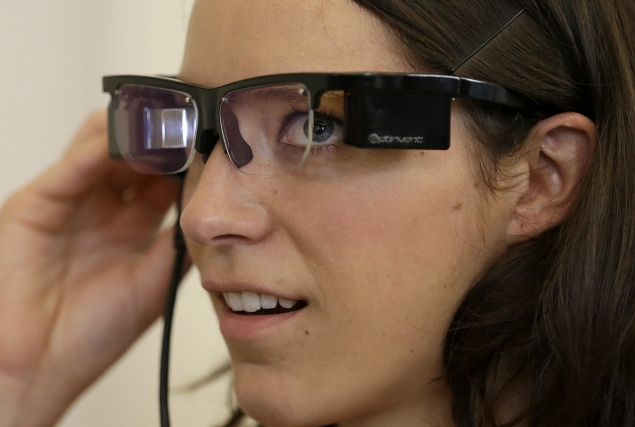- Home
- Others
- Others News
- Woman ticketed for driving with Google Glass, called a distraction by police
Woman ticketed for driving with Google Glass, called a distraction by police

Driver Cecilia Abadie was pulled over for speeding Tuesday evening, when a California Highway Patrol officer noticed she was wearing Google Glass and tacked on a citation usually given to drivers who may be distracted by a video or TV screen.
A challenge to what may be a first-of-its-kind citation could force authorities to re-examine laws and consider how best to regulate evolving gadgetry that will one day become mainstream.
The lightweight eyeglasses, which are not yet widely available to the public, feature a hidden computer and a thumbnail-size transparent display screen above the right eye. Users can scan maps for directions - as well as receive Web search results, read email and engage in video chats - without reaching for a phone.
About 10,000 have been distributed so far in the United States to "explorers" like Abadie, and this week Google announced another 30,000 would be available for $1,500 apiece. Abadie, a software developer, got what she describes as the life-changing technology in May.
In an interview Thursday, she said she was not using her Google Glass when she was pulled over for allegedly going about 80 mph in a 65 mph zone on the drive home to Temecula after visiting a friend.
"The Glass was on, but I wasn't actively using it" to conserve the battery, she said. The device becomes inactive if it's not asked to perform a task.
Abadie expressed surprise that wearing the glasses while driving would be illegal and said she's "pretty sure" she will fight the ticket. First, she said, she needs to seek legal counsel. In the flurry of online commentary her traffic stop has generated, several people saying they are attorneys offered their services.
"The law is not clear, the laws are very outdated," Abadie said, suggesting that navigating with the device could be less distracting than with a GPS unit or phone because drivers don't have to glance down.
"Maybe Glass is more a solution to the cellphone problem than a problem," she said.
It's unclear whether a citation for Google Glass has been issued before. The CHP said it is not sure whether an officer within its own ranks has written one, and an agency spokesman pointed out hundreds of law enforcement agencies in California alone can write traffic tickets.
What is clear, CHP Officer Marc Hale said, is that drivers should not use Google Glass.
"Anything that takes your attention away from the motoring public in front of you is a distraction," Hale said.
Though Google Glass users can continue looking ahead, by glancing at the screen they still divert attention from the roadway and that can make the headgear dangerous, according to David Strayer, director of the University of Utah's Center for the Prevention of Distracted Driving.
"Your eyes aren't looking where they need to look," said Strayer, who has tried Google Glass (though not behind the wheel). Like Abadie, he noted that the law lags far behind the technology.
Legislators in at least three states - Delaware, New Jersey and West Virginia - have introduced bills that would specifically ban driving with Google Glass.
A spokesman for Google Inc. did not reply to a request for comment. On its website, Google says this about using the headgear while driving: "Read up and follow the law. Above all, even when you're following the law, don't hurt yourself or others by failing to pay attention to the road."
Get your daily dose of tech news, reviews, and insights, in under 80 characters on Gadgets 360 Turbo. Connect with fellow tech lovers on our Forum. Follow us on X, Facebook, WhatsApp, Threads and Google News for instant updates. Catch all the action on our YouTube channel.
Related Stories
- Samsung Galaxy Unpacked 2026
- iPhone 17 Pro Max
- ChatGPT
- iOS 26
- Laptop Under 50000
- Smartwatch Under 10000
- Apple Vision Pro
- Oneplus 12
- OnePlus Nord CE 3 Lite 5G
- iPhone 13
- Xiaomi 14 Pro
- Oppo Find N3
- Tecno Spark Go (2023)
- Realme V30
- Best Phones Under 25000
- Samsung Galaxy S24 Series
- Cryptocurrency
- iQoo 12
- Samsung Galaxy S24 Ultra
- Giottus
- Samsung Galaxy Z Flip 5
- Apple 'Scary Fast'
- Housefull 5
- GoPro Hero 12 Black Review
- Invincible Season 2
- JioGlass
- HD Ready TV
- Latest Mobile Phones
- Compare Phones
- Tecno Pova Curve 2 5G
- Lava Yuva Star 3
- Honor X6d
- OPPO K14x 5G
- Samsung Galaxy F70e 5G
- iQOO 15 Ultra
- OPPO A6v 5G
- OPPO A6i+ 5G
- Asus Vivobook 16 (M1605NAQ)
- Asus Vivobook 15 (2026)
- Brave Ark 2-in-1
- Black Shark Gaming Tablet
- boAt Chrome Iris
- HMD Watch P1
- Haier H5E Series
- Acerpure Nitro Z Series 100-inch QLED TV
- Asus ROG Ally
- Nintendo Switch Lite
- Haier 1.6 Ton 5 Star Inverter Split AC (HSU19G-MZAID5BN-INV)
- Haier 1.6 Ton 5 Star Inverter Split AC (HSU19G-MZAIM5BN-INV)







![[Partner Content] OPPO Reno15 Series: AI Portrait Camera, Popout and First Compact Reno](https://www.gadgets360.com/static/mobile/images/spacer.png)









